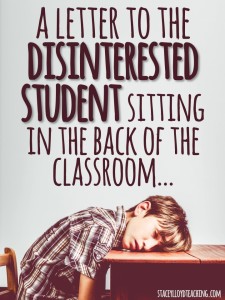An Open Letter to The Disinterested Student

Regularly I see you in my classroom. You are not there right away, but if I don’t manage to make the first five minutes of my lesson enticing (which, unfortunately happens more often than I like), then you appear.
Even without staring right at you, I am aware that you are drifting off: the way you comfortably slump down into your chair (as comfortably as one can in a plastic chair designed to guard against the very mood you are settling in to); the shifting of your gaze to the window, with a quick first glance up at the clock; the strategic movement of your arm to form a rest for your head.
You must know that I am keenly aware of these things. Even as I press on with a lesson about prepositions, or a poem about divergent forests, even as you think you have avoided my notice, I am keenly, distractedly, deeply aware.
Sometimes a faint smile passes across your face and I wonder what daydream you are having. I bet you are in some exciting world where you are the hero, or in love (or hopefully both). I watch as you stare intently at some distant sight outside; I know that you are no longer a participant in the learning taking place inside. You are somewhere else: somewhere apparently more thrilling and far more inspiring.
If you have to drift off, I wish your mind were always leaving my classroom for some adventurous, inspiring place. But sadly, there are times I fear you are somewhere quite the opposite. At those times, I am attentive to the tiredness and sadness in your eyes. I am conscious of the grey haze settling in, mindful of your body slumping lower still in your chair. I don’t know where you go then, but I wish you didn’t even know of that place. Still, I hope you are working through whatever it is you are consumed with in those moments.
At first you distracted me. I would see you drift off and silently panic, quickly trying to find some clever way to draw you back in. I would speak louder; I would wander over and tap on your desk; I would throw a question your way – anything to get you back into the lesson.
But now I view you differently. I no longer mind your occasional, fleeting presence. I’m aware that in this world there is always noise. There is often chaos. There are continuous distractions. There is so much that young people have to deal with on a daily basis. So when you drift off, I know that for ten minutes or so, there is stillness. I know that you are exercising your imagination. You are working through a problem. You are reflecting on an issue. You are simply having time to stop, feel safe and be quiet. Something you may not have the privilege of doing at home.
I must say that since being aware of your distraction, I have actively tried to plan lessons to prevent your leaving the classroom. And I have seen you drift off less often. It is good: it means I am teaching something engaging. But occasionally, I let you slip away. I know the joy of your realms of excitement and imagination, the value of your worlds of introspection and reflection – I know that they are sometimes vitally necessary and important.
As long as you don’t go too often or for too long, you are welcome drift off in my classroom.
With love from this side of the desk,
Your Teacher
Looking for engaging lesson plans & materials to prevent students drifting off in class? Click here.


Michelle
“You are simply having time to stop, feel safe and be quiet. Something you may not have the privilege of doing at home.” I really like that perspective!
I think it is wise for teachers reflect on student behavior rather than quickly scold or discipline students for smaller problems like drifting off.
At the middle school level I didn’t get so much drifting off, it was goofing off. I knew when a lesson was not interesting enough because I had a lot more behavior problems. It pushed me to work extra hard on lesson plans!
staceylloyd
MichelleThanks so much for taking the time to comment. You are right – goofing off is more tricky to handle! 😉